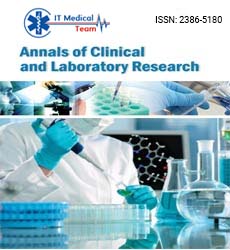Mini Review - (2023) Volume 11, Issue 6
Cardiovascular Disease and Clinical Biochemistry: Early Detection and Prevention
Esin Kutlu*
Department of Biochemistry, Pamukkale University, Turkey
*Correspondence:
Esin Kutlu, Department of Biochemistry, Pamukkale University,
Turkey,
Email:
Received: 01-Nov-2023
Published:
27-Nov-2023, DOI: 10.36648/2386-5180.23.11.490
Abstract
Cardiovascular diseases (CVDs) remain a leading cause of mortality worldwide, emphasizing the critical need for early detection and prevention strategies. Clinical biochemistry, a branch of medical science, plays a pivotal role in identifying biomarkers associated with CVDs, enabling timely intervention and risk reduction. This article explores the significance of clinical biochemistry in early detection and prevention of cardiovascular diseases, highlighting key biomarkers and innovative diagnostic techniques that are shaping the future of cardiovascular healthcare
Introduction
Cardiovascular diseases encompass a range of conditions affecting
the heart and blood vessels, including coronary artery disease,
heart failure, and stroke. Early detection of these conditions is
crucial for implementing preventive measures and reducing the
risk of life-threatening events [1]. Clinical biochemistry, through
the analysis of blood and bodily fluids, provides valuable insights
into the biochemical changes associated with cardiovascular
diseases, aiding in timely diagnosis and targeted interventions
[2,3].
Biomarkers in Cardiovascular Disease: Clinical biochemistry
identifies specific biomarkers indicative of cardiovascular
risk. High-sensitivity C-reactive protein (hs-CRP), for instance,
is associated with inflammation and predicts the likelihood
of heart attacks. Elevated levels of low-density lipoprotein
cholesterol (LDL-C) and triglycerides are well-known risk factors
for atherosclerosis, a precursor to many CVDs. Additionally,
biomarkers like B-type natriuretic peptide (BNP) aid in diagnosing
heart failure, allowing for prompt medical intervention [4,5].
Innovative Diagnostic Techniques: Advancements in clinical
biochemistry have led to the development of innovative
diagnostic techniques for cardiovascular diseases. Molecular
biomarker profiling, involving the analysis of genetic and
proteomic markers, enables a more personalized approach to
risk assessment. High-throughput screening methods allow for
the simultaneous analysis of multiple biomarkers, enhancing
the accuracy and efficiency of cardiovascular disease diagnosis
[6-8].
Prevention Strategies: Clinical biochemistry not only aids in
early detection but also informs preventive strategies. Lifestyle
modifications, such as a balanced diet and regular physical
activity, contribute significantly to cardiovascular health.
Clinical biochemistry can assess markers like cholesterol levels
and blood glucose, guiding individuals towards healthier
choices. Moreover, pharmacogenomic studies, enabled by
biochemistry, help tailor medication regimens based on an
individual's genetic makeup, maximizing effectiveness and
minimizing adverse effects [9].
The Future of Cardiovascular Healthcare: The integration of
clinical biochemistry with cutting-edge technologies like artificial
intelligence and machine learning holds great promise for the
future of cardiovascular healthcare. Predictive algorithms,
trained on vast datasets of biochemical profiles, can identify
patterns and predict cardiovascular risks with remarkable
accuracy. Telemedicine and wearable devices equipped with
biochemical sensors empower individuals to monitor their health
in real-time, enabling proactive management of risk factors [10].
Conclusion
Clinical biochemistry stands at the forefront of early detection
and prevention efforts in the realm of cardiovascular diseases.
By identifying specific biomarkers and utilizing innovative
diagnostic techniques, healthcare professionals can assess risks
accurately and intervene promptly, thereby improving patient
outcomes and reducing the burden of cardiovascular diseases on
individuals and societies. As research continues to unravel the
complexities of biochemical markers, the integration of clinical biochemistry with advanced technologies ensures a future
where cardiovascular diseases are not only detected early but
also prevented effectively, paving the way for a healthier, heartconscious
global population.
References
- Sharma P, Mishra S (2007). Metabolic syndrome: early identification prevents type II diabetes and cardiovascular disease. Indian J Clin Biochem.22:1-3.
Indexed at, Google Scholar, Cross Ref
- Ridker PM (2003). Clinical application of C-reactive protein for cardiovascular disease detection and prevention. Circulation.107(3):363-9.
Indexed at, Google Scholar, Cross Ref
- Celermajer DS, Chow CK, Marijon E, Anstey NM, Woo KS (2012). Cardiovascular disease in the developing world: prevalences, patterns, and the potential of early disease detection. J Am Coll Cardiol. 60(14):1207-16.
Indexed at, Google Scholar, Cross Ref
- Maschirow L, Khalaf K, Al-Aubaidy HA, Jelinek HF (2015). Inflammation, coagulation, endothelial dysfunction and oxidative stress in prediabetes—Biomarkers as a possible tool for early disease detection for rural screening. Clin. Biochem.48(9):581-5.
Indexed at, Google Scholar, Cross Ref
- Nadir MA, Rekhraj S, Wei L, Lim TK, Davidson J, et al (2012). Improving the primary prevention of cardiovascular events by using biomarkers to identify individuals with silent heart disease. J Am Coll Cardiol. 60(11):960-8.
Indexed at, Google Scholar, Cross Ref
- Ridker PM (2009). C-reactive protein: eighty years from discovery to emergence as a major risk marker for cardiovascular disease. Clinical chemistry. 55(2):209-15.
Indexed at, Google Scholar, Cross Ref
- Wu AH, Apple FS, Gibler WB, Jesse RL, Warshaw MM, et al (1999). National Academy of Clinical Biochemistry Standards of Laboratory Practice: recommendations for the use of cardiac markers in coronary artery diseases. Clinical chemistry. 45(7):1104-21.
Indexed at, Google Scholar
- Gilstrap LG, Wang TJ (2012). Biomarkers and cardiovascular risk assessment for primary prevention: an update. Clinical chemistry. 58(1):72-82.
Indexed at, Google Scholar, Cross Ref
- Amrita J, Mahajan M, Bhanwer AJ, Mohan G (2016). Oxidative stress: An effective prognostic tool for an early detection of cardiovascular disease in menopausal women. Biochemistry research international.
Indexed at, Google Scholar, Cross Ref
- Fu Y, Guo J (2018). Blood cholesterol monitoring with smartphone as miniaturized electrochemical analyzer for cardiovascular disease prevention. IEEE Trans Biomed Circuits Syst. 12(4):784-90.
Indexed at, Google Scholar, Cross Ref
Citation: Kutlu E (2023) Cardiovascular Disease and Clinical Biochemistry: Early Detection and Prevention. Ann Clin Lab Res. Vol.11 No.6:490






